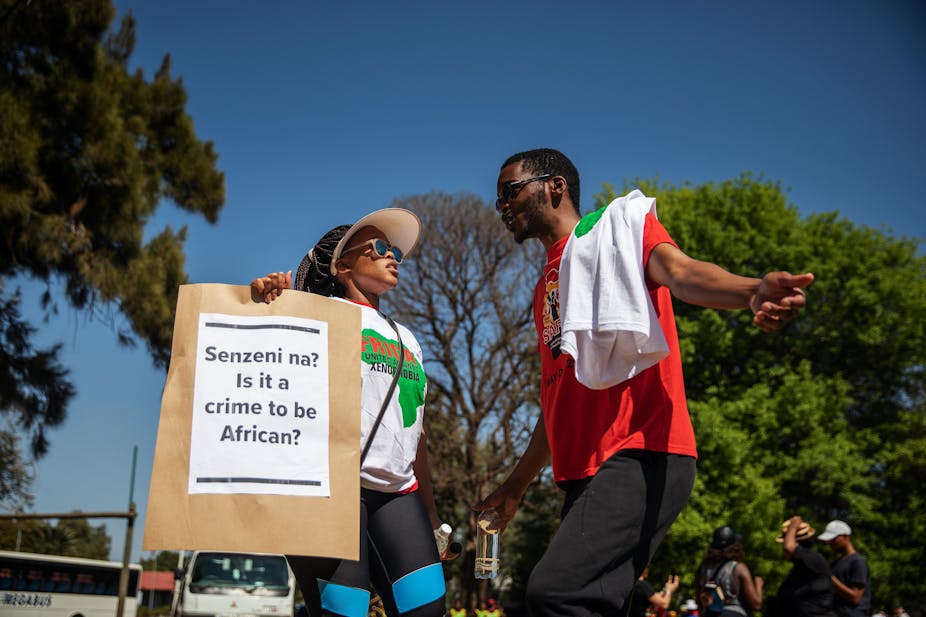In the last decade or so, xenophobic attacks have made headlines a number of times in South Africa. The most recent wave occurred in August and September 2019, targeting migrants from other African countries in and around Johannesburg.
The government does not gather any data regarding xenophobic attacks. Organisations such as Xenowatch and the UN Refugee Agency bridge that gap. An overview report by Xenowatch recorded 529 xenophobic incidents that led to 309 deaths; 901 physical assaults and 2 193 looted shops between 1994 and 2018. More than 100 000 people were displaced in this period. Between January and September 2019 Xenowatch “recorded 68 incidents of xenophobic violence, which have resulted in 18 deaths, at least 43 physical assaults, 1449 displaced people and an estimation of at least 127 plus shops looted”.
There are many complex reasons for xenophobia in South Africa. These include racial and linguistic diversity, low education levels and lack of service delivery. Sometimes local governance is seen to sanction xenophobic attacks or not provide positive leadership. Impunity is another issue.
One aspect that has not been explored is the role that language might play in xenophobia.
We suggest that looking at xenophobia from a sociolinguistic angle could contribute to a better understanding of the phenomenon, and longer-term solutions.
Read more: How South Africa is denying refugees their rights: what needs to change
Three questions should guide this discussion. Firstly, what does the South African government do to integrate immigrants on a linguistic level? Secondly, are immigrants marginalised because of their linguistic backgrounds? Finally, how could linguistic interventions contribute to peace building?
It might be useful here to look at the work done by other countries or regions like the European Union. Germany, for example, makes it compulsory for migrants to pass a German language test to encourage social integration and social cohesion. But South Africa cannot merely copy these examples: something is needed that will work for the country’s multilingual landscape and against the backdrop of its particular issues.
This isn’t to suggest that merely tackling linguistic issues will somehow eradicate the complex social phenomenon of xenophobia. But it is an important element that should be considered.
Integration
South Africa is a linguistically diverse country, with 11 official languages. United Nations statistics put the population of international migrants – most of them from other African countries –at around 4 million. Most, according to the UN’s Department of Economic and Social Affairs, come from Mozambique, Lesotho, Zimbabwe, Namibia and the United Kingdom.
There are no statistics available on what languages these migrants speak. It has been shown by scholars that migrants tend to use ‘destination languages’ once they arrive in South Africa. But this isn’t an organised or structured process; it’s done by individuals on an ad hoc basis.
South Africa’s Department of Justice and Constitutional Development has created a National Action Plan to combat “racism, racial discrimination, xenophobia and related intolerance”, as well as an implementation plan.
The action plan asserts that people may not be discriminated against based on language. But, there is only one reference to language in the implementation plan: to
[p]romote and disseminate accessible human rights information and other materials in a simplified form in national and local languages, safeguarding the rights to equality and non-discrimination.
This focus on national and local languages excludes immigrants from elsewhere in Africa. It means they don’t know their language rights. The plan also doesn’t explore ways in which immigrants can be integrated on a linguistic level. Nor do any linguistic plans exist anywhere else in the public domain.
Marginalised languages
The second question is whether immigrants are marginalised because of their linguistic backgrounds.
Research has shown that African immigrants in South Africa refrain from speaking their own languages and try to speak local languages to blend in. In one study, African international students at a Cape Town university said they’d learned basic isiXhosa and Afrikaans to protect themselves.
Immigrants have told researchers they are “victims of stereotypes, prejudices, intolerance and discrimination”. In a study that focused on Zimbabwean immigrants’ experiences, participants said they’d been marginalised or even attacked by South Africans who accused them of not being able to speak a local indigenous language.
Read more: University education in refugee camps must meet refugee needs
There is clearly a need to destigmatise “foreign” African languages and to give African immigrants safe environments to learn South African languages. This brings us to the last question: how could linguistic interventions in an integration programme contribute to peace building?
Peace building
Languages alone will not solve the problem of xenophobia. But they are definitely a part of the solution. As UNESCO has said, referring to the International Year of Indigenous Languages:
[i]ndigenous languages matter for development, peace building and reconciliation.
A linguistic intervention in South Africa could entail the following:
Educating people about their linguistic and other human rights and obligations in languages that they understand.
Ensuring that immigrants have safe access to language courses so that they can learn the regional lingua francas (isiXhosa, Setswana, Afrikaans, and so on). English alone will not suffice. Regional lingua francas will let them integrate faster as they might be regarded as “one of us”. This will be a good opportunity for the South African government to develop a truly multilingual society and ensure social cohesion.
South African officials working with immigrants should be trained to understand and appreciate linguistic and cultural differences. Basic language courses in other African languages might make a big difference.
South Africans should be made aware of their own prejudices and unfair stereotyping when it comes to languages. Language courses in foreign African languages could be helpful in this regard.

